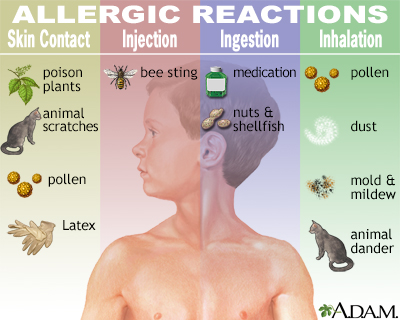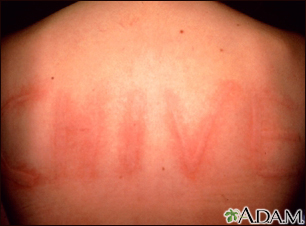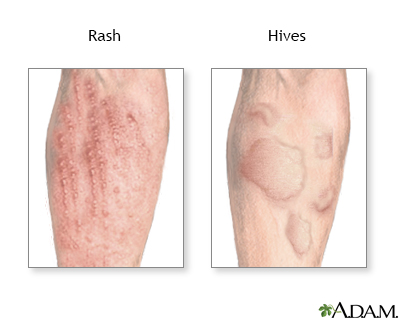Allergic reactions
Anaphylaxis; Anaphylaxis - first aid
Allergic reactions are sensitivities to substances called allergens that come into contact with the skin, nose, eyes, respiratory tract, and gastrointestinal tract. They can be breathed into the lungs, swallowed, or injected.

Allergic reaction can be provoked by skin contact with poison plants, chemicals and animal scratches, as well as by insect stings. Ingesting or inhaling substances like pollen, animal dander, molds and mildew, dust, nuts and shellfish, may also cause allergic reaction. Medications such as penicillin and other antibiotics are also to be taken with care, to assure an allergic reflex is not triggered.

Dermatographism is a condition where lightly scratching the skin raises wheals or welts. Histamine is released, which causes the small blood vessels (capillaries) to dilate, producing redness and localized swelling.

Dermatographism is a condition where lightly scratching the skin raises wheals or welts. Histamine is released at the site, causing the small blood vessels (capillaries) to dilate, producing redness and localized swelling.

Hives (urticaria) are raised, red, itchy welts, seen here on the arm. The majority of urticaria develop as a result of allergic reactions. Occasionally, they may be associated with autoimmune diseases, infections (parasitosis), drugs, malignancy, or other causes.

Hives (urticaria) are raised, red, itchy welts, seen here on the chest. The majority of urticaria develop as a result of allergic reactions. Occasionally they may be associated with autoimmune diseases, infections (parasitosis), drugs, malignancy, or other causes.

Hives (urticaria) are raised, red, itchy welts. The majority of urticaria develop as a result of allergic reactions. Occasionally, they may be associated with autoimmune diseases, infections (parasitosis), drugs, malignancy, or other causes.

This person has raised, red, itchy welts (urticaria) on the chest and abdomen. The majority of urticaria develop as a result of allergic reactions. Occasionally, they may be associated with autoimmune diseases, infections (parasitosis), drugs, malignancy, or other causes.

In dermatographism, hives are readily produced if the skin is lightly scratched.

Wheal formation at the site of light scratching of the skin.

Allergic reaction is a sensitivity to a specific substance, called an allergen, that is contacted through the skin, inhaled into the lungs, swallowed or injected. The body's reaction to an allergen can be mild, such as a localized rash, or life-threatening, such as anaphylactic shock.
Blooming flowers and blossoming trees are signs that spring has arrived. But for some people, those blossoms and blooms are also signs that allergy season is under way. And that means months of sniffling, sneezing, and runny eyes ahead. You may know that you have allergies as soon as you step outside on a spring day, eat peanuts, or pet your dog. Signs of an allergy may include trouble breathing, teary eyes, hives, itching, or vomiting after you come in contact with your allergy trigger. Your doctor can also do allergy tests to find out whether you're allergic, and what triggers your allergies. The most common type of allergy test is a skin test. The doctor puts a small amount of different allergy-causing substances under your skin. Then you wait for signs of a reaction, like swelling or redness. You might also have blood tests to check for chemicals that are related to allergies. So, how are allergies treated? There are a few medicines you can buy at your local drugstore or your doctor can prescribe to treat your allergies. Antihistamines prevent histamine chemicals from triggering allergy symptoms. Decongestants shrink swollen blood vessels throughout your body, including inside your nose, perhaps helping you breathe easier. Steroid drugs reduce swelling and inflammation. And Leukotriene inhibitors block the substances that trigger allergies. If your allergy is really bugging you, your doctor may give you allergy shots. When you take allergy shots over time, eventually they can help your body get used to the substance so you don't over-react to it in the future. Usually you can relieve allergies by taking medicine and avoiding whatever it is that triggers them. But in some people, allergies to insect stings or certain foods, like peanuts, cause a life-threatening reaction. This is called anaphylaxis. And if you have a life-threatening allergic reaction, call immediately for emergency medical help.
Considerations
Allergic reactions are common. The immune response that causes an allergic reaction is similar to the response that causes hay fever. Most reactions happen soon after contact with an allergen.
Many allergic reactions are mild, while others can be severe and life threatening. They can be confined to a small area of the body, or they may affect the entire body. The most severe form is called anaphylaxis or anaphylactic shock. Allergic reactions occur more often in people who have a family history of allergies.
Substances that don't bother most people (such as venom from bee stings and certain foods, medicines, and pollens) can trigger allergic reactions in certain people.
First-time exposure may produce only a mild reaction. Repeated exposures may lead to more serious reactions. Once a person has had an exposure or an allergic reaction (is sensitized), even a very limited exposure to a very small amount of allergen can trigger a severe reaction.
Most severe allergic reactions occur within seconds or minutes after exposure to the allergen. Some reactions can occur after several hours, particularly if the allergen causes a reaction after it has been eaten. In very rare cases, reactions develop after 24 hours.
Anaphylaxis is a sudden and severe allergic reaction that occurs within minutes of exposure. Immediate medical attention is needed for this condition. Without treatment, anaphylaxis can get worse very quickly and lead to death within 15 minutes.
Causes
Common allergens include:
- Animal dander
- Bee stings or stings from other insects
- Foods, especially nuts, fish, and shellfish
- Insect bites
- Medicines
- Plants
- Pollens
Symptoms
Common symptoms of a mild allergic reaction include:
Symptoms of a moderate or severe reaction include:
- Abdominal pain
- Abnormal (high-pitched) breathing sounds
- Anxiety
- Chest discomfort or tightness
- Cough
- Diarrhea
- Difficulty breathing, wheezing
- Difficulty swallowing
- Dizziness or lightheadedness
- Flushing or redness of the face
- Nausea or vomiting
- Palpitations
- Swelling of the face, eyes, or tongue
- Unconsciousness
First Aid
For a mild to moderate reaction:
Calm and reassure the person having the reaction. Anxiety can make symptoms worse.
Try to identify the allergen and have the person avoid further contact with it.
- If the person develops an itchy rash, apply cool compresses and an over-the-counter hydrocortisone cream.
- Watch the person for signs of increasing distress.
- Get medical help. For a mild reaction, a health care provider may recommend over-the-counter medicines, such as antihistamines.
For a severe allergic reaction (anaphylaxis):
Check the person's airway, breathing, and circulation (the ABC's of Basic Life Support). A warning sign of dangerous throat swelling is a very hoarse or whispered voice, or coarse sounds when the person is breathing in air. If necessary, begin rescue breathing and CPR.
- Call 911 or the local emergency number.
- Calm and reassure the person.
- If the allergic reaction is from a bee sting, scrape the stinger off the skin with something firm (such as a fingernail or plastic credit card). Do not use tweezers -- squeezing the stinger will release more venom.
- If the person has injectable emergency allergy medicine (Epinephrine), administer it at the beginning of a reaction. Do not wait to see if the reaction gets worse. Avoid oral medicine if the person is having difficulty breathing.
- Take steps to prevent shock. Have the person lie flat, raise the person's feet about 12 inches (30 centimeters), and cover them with a coat or blanket. Do not place the person in this position if a head, neck, back, or leg injury is suspected or if it causes discomfort.
Do Not
If a person is having an allergic reaction:
- Do not assume that any allergy shots the person has already received will provide complete protection.
- Do not place a pillow under the person's head if he or she is having trouble breathing. This can block the airways.
- Do not give the person anything by mouth if the person is having trouble breathing.
When to Contact a Medical Professional
Contact for medical assistance (911 or the local emergency number) right away if:
- The person is having a severe allergic reaction. Do not wait to see if the reaction is getting worse.
- The person has a history of severe allergic reactions (check for a medical ID tag).
Prevention
To prevent allergic reactions:
- Avoid triggers such as foods and medicines that have caused an allergic reaction in the past. Ask detailed questions about ingredients when you are eating away from home. Carefully check ingredient labels.
- If you have a child who is allergic to certain foods, introduce one new food at a time in small amounts so you can recognize an allergic reaction.
- People who have had serious allergic reactions should wear a medical ID tag and carry emergency medicines, such as a chewable form of chlorpheniramine (Chlor-Trimeton), and injectable epinephrine or a bee sting kit, according to your provider's instructions.
- Do not use your injectable epinephrine on anyone else. They may have a condition, such as a heart problem, that could be made worse by this drug.
References
Auerbach PS. Allergic reaction. In: Auerbach PS, ed. Medicine for the Outdoors. 6th ed. Philadelphia, PA: Elsevier; 2016:64-65.
Barksdale AN, Muelleman RL. Allergy, hypersensitivity, and anaphylaxis. In: Walls RM, Hockberger RS, Gausche-Hill M, eds. Rosen's Emergency Medicine: Concepts and Clinical Practice. 9th ed. Philadelphia, PA: Elsevier; 2018:chap 109.
Custovic A, Tovey E. Allergen control for prevention and management of allergic diseases. In: Burks AW, Holgate ST, O'Hehir RE, et al, eds. Middleton's Allergy: Principles and Practice. 9th ed. Philadelphia, PA: Elsevier; 2020:chap 84.
Shaker MS, Wallace DV, Golden DBK, et al. Anaphylaxis-a 2020 practice parameter update, systematic review, and grading of recommendations, assessment, development and evaluation (GRADE) analysis. J Allergy Clin Immunol. 2020;145(4):1082-1123. PMID: 32001253
Version Info
Last reviewed on: 1/23/2022
Reviewed by: Stuart I. Henochowicz, MD, FACP, Clinical Professor of Medicine, Division of Allergy, Immunology, and Rheumatology, Georgetown University Medical School, Washington, DC. Also reviewed by David Zieve, MD, MHA, Medical Director, Brenda Conaway, Editorial Director, and the A.D.A.M. Editorial team.
